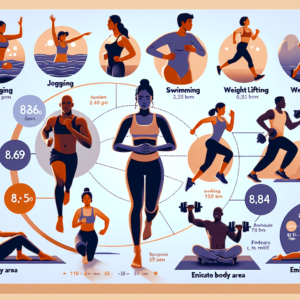Losing weight can be a journey filled with triumphs and challenges, and as you approach the finish line, you may have noticed that shedding those last stubborn 10 pounds is no easy task. It’s a common dilemma many of us face, but have you ever wondered why those last few pounds seem to cling on for dear life? In this article, we’ll explore the reasons why these final pounds can be so elusive, providing insights and tips to help you conquer this weight loss plateau and achieve your goals. So, let’s dig in and uncover the secrets behind why the last 10 lbs are the hardest to lose!

Biological Factors
Losing weight is often challenging, especially when it comes to shedding those last stubborn pounds. Several biological factors contribute to this difficulty. One such factor is the Set Point Theory, which suggests that your body has a predetermined weight range in which it is comfortable and resistant to change. When you reach a plateau in your weight loss journey, it may be due to your body trying to maintain its set point.
Another biological factor that can impede weight loss is a decreased metabolic rate. As you lose weight, your body requires fewer calories to function, resulting in a lower metabolic rate. This decreased metabolic rate makes it harder to create a calorie deficit and can lead to slower weight loss progress. Additionally, adaptive thermogenesis, a mechanism in which your body adjusts its energy expenditure to defend against weight loss, can further contribute to the challenge of losing those last 10 pounds.
Psychological Factors
The human mind plays a significant role in weight loss, and several psychological factors can make those last 10 pounds particularly challenging to shed. Plateauing, or a lack of progress despite continued effort, can be demotivating and lead to a decrease in adherence to your weight loss plan. Maintaining your motivation throughout your weight loss journey is crucial, as it can help you stay focused and overcome challenges.
Emotional eating is another psychological factor that can hinder weight loss efforts, especially when it comes to losing those last few pounds. Stress, boredom, or other emotions can trigger the desire to eat, even when you aren’t physically hungry. Understanding and managing your emotional eating patterns can make it easier to stay on track with your weight loss goals.
Lifestyle Factors
Your lifestyle habits and choices can significantly impact your ability to lose those last stubborn pounds. Lack of physical activity is a common lifestyle factor that can hinder weight loss progress. Regular exercise not only helps you burn calories but also increases your metabolism, making it easier to create a calorie deficit and achieve your weight loss goals.
Inconsistent diet patterns also play a role in the difficulty of losing the last 10 pounds. Going on and off diets or constantly changing your eating patterns can confuse your body and hinder weight loss progress. Developing a consistent and sustainable eating plan that aligns with your goals is key.
Additionally, your sleeping patterns can influence your weight loss efforts. Lack of sleep has been linked to increased hunger and cravings for unhealthy foods, making it harder to stick to a healthy eating plan. Prioritizing good sleep hygiene and getting enough restful sleep can support your weight loss journey.
Hormonal Changes
Hormonal changes can have a significant impact on weight loss, particularly when it comes to losing those last few pounds. Leptin resistance, a condition in which your body becomes less responsive to the hormone leptin, can make it harder to control your appetite and maintain weight loss. Similarly, imbalances in the hunger hormone ghrelin can increase hunger and make it challenging to stick to a calorie deficit.
Insulin resistance, a condition commonly associated with obesity, can also impede weight loss efforts. When your body becomes resistant to the effects of insulin, it can lead to higher blood sugar levels and increased fat storage. Managing insulin resistance through lifestyle changes and, if necessary, medical interventions can help promote successful weight loss.

Muscle vs. Fat
Understanding the dynamics between muscle and fat is essential when it comes to losing those last stubborn pounds. Fat loss versus muscle gain becomes more challenging as you approach your goal weight. Your body naturally wants to hold onto fat, especially in certain areas like the abdomen, while losing muscle mass can further slow down your metabolism.
However, focusing on building lean body mass can be beneficial for weight loss. Muscle burns more calories at rest compared to fat, so increasing your muscle mass through strength training can help boost your metabolism and make it easier to create a calorie deficit. Additionally, body composition plays a role in how your weight loss is distributed, and achieving a healthy body composition can contribute to successfully losing those last 10 pounds.
Impact of Age
As we age, losing weight becomes even more challenging. Several factors contribute to this difficulty, including a slowing metabolism. With age, our bodies naturally burn fewer calories, making it harder to create a calorie deficit. Hormonal changes, such as a decrease in estrogen for women and a decline in testosterone for men, can also affect weight loss.
Another age-related factor is decreased muscle mass. As we get older, we tend to lose muscle, which further slows down our metabolism. To combat the impact of age on weight loss, it becomes even more important to focus on strength training, maintaining a healthy diet, and making lifestyle changes that support a sustainable weight loss journey.
Nutritional Factors
Nutrition plays a crucial role in weight loss, and several factors related to your diet can affect your ability to lose those last stubborn pounds. Achieving the right balance of macronutrients, such as carbohydrates, protein, and fats, is essential. Each macronutrient plays a specific role in your body, and finding the right balance that supports your weight loss goals is crucial.
Micronutrient deficiencies can also hinder weight loss. When your body lacks essential vitamins and minerals, it can impact your energy levels, metabolism, and overall health. Ensuring you consume a varied and nutrient-dense diet can help support your weight loss efforts.
Finally, caloric intake is a fundamental factor in weight loss. Creating a calorie deficit by consuming fewer calories than your body needs is necessary for weight loss. However, it’s important to strike a balance and avoid overly restrictive diets, as they can be unsustainable and ultimately hinder your progress.
Genetic Predisposition
Genetics can also play a role in the difficulty of losing those last 10 pounds. Adiponectin levels, a hormone involved in regulating metabolism and glucose levels, can vary among individuals. Low levels of adiponectin have been associated with increased body weight and reduced weight loss.
The FTO gene, commonly known as the “fat gene,” has been linked to obesity and the difficulties individuals may face in losing weight. Genetic variants related to appetite control, metabolism, and fat storage can also impact weight loss outcomes. While genetics may influence your body’s natural tendencies, they do not dictate your ability to make positive lifestyle changes and achieve your weight loss goals.
Adherence Challenges
Maintaining adherence to a weight loss plan can be tough, especially when it comes to losing those last few pounds. Unrealistic expectations can lead to frustration and a lack of motivation. It’s essential to set realistic and achievable goals to avoid getting discouraged.
Consistency is another challenge faced during the weight loss journey. Life can be unpredictable, and it’s normal to have setbacks or deviations from your plan. However, maintaining consistency in your habits and making progress over time is more important than being perfect every day.
Social pressures can also affect adherence to a weight loss plan, particularly when it comes to social gatherings or dining out. It’s important to communicate your goals and needs to those around you and find ways to navigate social situations without derailing your progress. Surrounding yourself with a supportive network can be instrumental in staying on track.
Stress and Cortisol
Stress is a common factor that can make losing those last 10 pounds even more challenging. Chronic stress can lead to elevated cortisol levels, a hormone associated with increased appetite and cravings for unhealthy foods. This can make it harder to adhere to a healthy eating plan and create a calorie deficit.
Emotional eating is another way in which stress can impact weight loss efforts. When faced with stressors, you may turn to food as a coping mechanism, even when you are not physically hungry. Developing strategies to manage stress effectively and finding alternative coping mechanisms can support successful weight loss.
Disrupted sleep patterns, often associated with stress, can also hinder weight loss. Lack of quality sleep has been linked to increased hunger and cravings, decreased energy levels, and a higher likelihood of making unhealthy food choices. Prioritizing sleep hygiene and establishing a consistent sleep routine can help improve your chances of losing those last stubborn pounds.
In conclusion, losing those last 10 pounds is challenging due to a combination of biological, psychological, lifestyle, hormonal, genetic, and adherence factors. Understanding these factors and making targeted changes in your approach can help overcome these challenges and achieve your weight loss goals. Remember to be patient, consistent, and kind to yourself throughout the process. You’ve got this!



